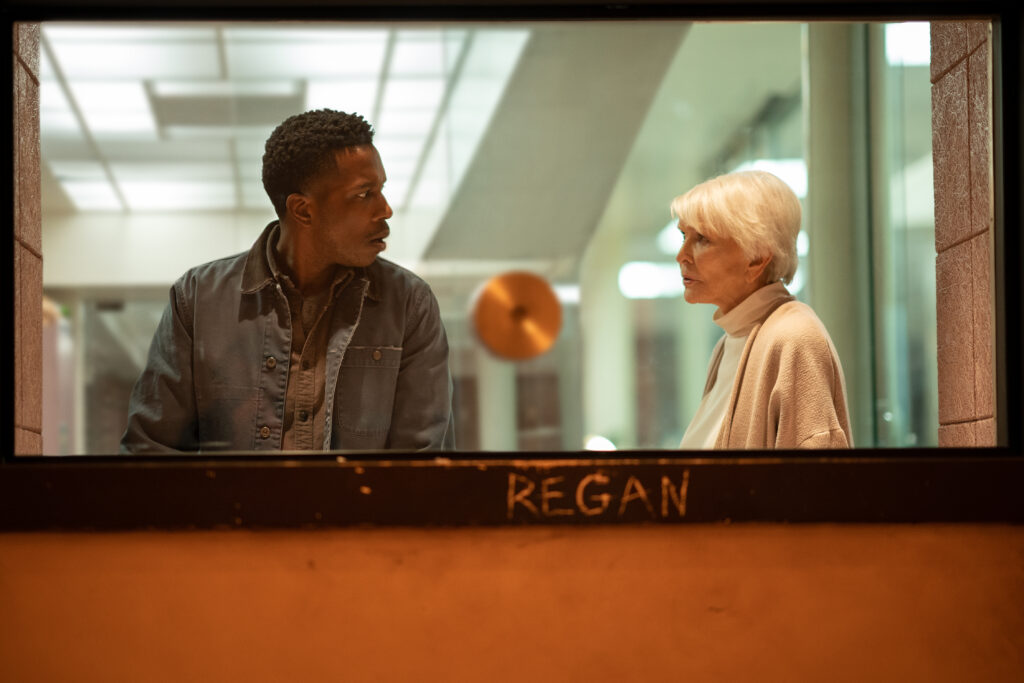October 4, 2023
by Carla Hay

Directed by David Gordon Green
Culture Representation: Taking place in an unnamed U.S. city, the horror film “The Exorcist: Believer” features a predominantly white cast of characters (with some African Americans) representing the working-class and middle-class.
Culture Clash: Two 13-year-old girls, who are best friends, go missing for three days, return home, and are later found to be possessed by evil spirits.
Culture Audience: “The Exorcist: Believer” will appeal primarily to people who are fans of “The Exorcist” franchise, but it’s another disappointing sequel in the series.

“The Exorcist: Believer” will make you lose faith that there can ever be a movie in this series as outstanding as 1973’s Oscar-winning “The Exorcist.” This sad excuse for a sequel is a mishmash of exorcism clichés, disjointed scenes and underdeveloped characters. It’s not a good sign when the best part of the movie is the ending, which has a not-very-surprising but still welcome cameo from a familiar character.
Directed by David Gordon Green, “The Exorcist: Believer” (co-written by Green and Peter Sattler) begins with showing how two 13-year-old girls who are best friends—Angela Fielding (played by Lidya Jewett) and Katherine West (played by Olivia O’Neill, also known as Olivia Marcum)—go missing for three days. When they are found together—dazed and confused in someone’s barn—Angela and Katherine are returned home to their worried but relieved parents, who then find out something even more disturbing than Angela and Katherine not knowing why they disappeared for three days: Angela and Katherine have been possessed by evil spirits.
Angela’s widower father Victor Fielding (played by Leslie Odom Jr.) has lost his faith in religion, ever since his wife died while giving birth to Angela in 2010, during the massive earthquake that hit Haiti. By contrast, Katherine’s parents Miranda West (played by Jennifer Nettles) and Tony West (played by Norbert Leo Butz) are very religious Christians who go to church on a regular basis. Victor has a nosy neighbor named Ann Brooks (played by Ann Dowd), who happens to be a hospital nurse and an amateur exorcist.
What does all of this really mean? It’s just an excuse for repetitive scenes of Victor resisting any spiritual explanation for what’s wrong with Angela, until he eventually gives in and contacts exorcism expert/author Chris MacNeil (played by Ellen Burstyn), the mother of the possessed adolescent in the first “Exorcist” movie. Chris is now estranged from her daughter Regan, who was 12 years old when Regan underwent an exorcism. Chris mentions in “The Exorcist: Believer” that she doesn’t even know where Regan lives.
“The Exorcist: Believer” is Burstyn’s first appearance in an “Exorcist” movie since “The Exorcist.” Whatever salary Burstyn was paid, it doesn’t compensate for the creatively bankrupt “The Exorcist: Believer,” which doesn’t give her much to do as Chris MacNeil but stand around or talk about what she knows about exorcism. There’s a violent scene involving Chris that will upset some fans of the first “Exorcist” movie because of what happens to Chris in this scene.
Green also convinced Jamie Lee Curtis (star of the original 1978 “Halloween” movie) to do a trio of “Halloween” sequels that he directed and co-wrote: 2018’s “Halloween” (very good), 2021’s “Halloween Kills” (awful) and 2022’s “Halloween Ends” (even worse). With “The Exorcist Believer,” Green has now tarnished Burstyn’s legacy for this franchise. Chris should have had at least as much screen time as Victor, who has only a few scenes where he gets to show some emotional range. For the most part, Victor is a one-note character.
And forget about having any memorable clergy characters in “The Exorcist: Believer.” All of the clergy in this shallow movie are generic as generic can be. The priest who gets the most screen time is Father Maddox (played by E.J. Bonilla), who is very wishy-washy about getting involved in this exorcism. At first, he’s dead-set against it, but then he changes his mind in a very poorly explained part of the movie. Two other clergymen are in the mix—Pentecostal preacher Stuart (played by Danny McCarthy) and Baptist pastor Don Revans (played by Raphael Sbarge)—but they are mostly useless characters, since they are not spiritually ordained, such as a priest, minister or rabbi.
Another vaguely written character is Dr. Beehibe (played by Okwui Okpokwasili), a root doctor, who gets involved in the exorcism. Ann and Dr. Beehibe know each other, which is how Dr. Beehibe is introduced to the parents of the demon-possessed Angela and Katherine, who do the usual hissing, scowling, and talking in deep-toned voices that are not their own. Dr. Beehibe does things in time-wasting scenes, such as draw occult-like circles, talk about herbs, and chant in forgettable rituals. She becomes the leader of the exorcism, but the movie does a terrible job of explaining why Dr. Beehibe is supposed to be more capable than spiritually ordained clergy to cast out demons.
In “The Exorcist: Believer,” the jump scares and exorcism scenes are dull and stereotypical. All of the cast members give mediocre performances that are slightly better than the lackluster screenplay and haphazard direction. The last scene (with the not-so-surprise appearance) in “The Exorcist: Believer” is the best scene, which will leave viewers thinking that the last scene would have made a much better movie than the rest of “The Exorcist: Believer.”
Universal Pictures will release “The Exorcist: Believer” in U.S. cinemas on October 6, 2023.

